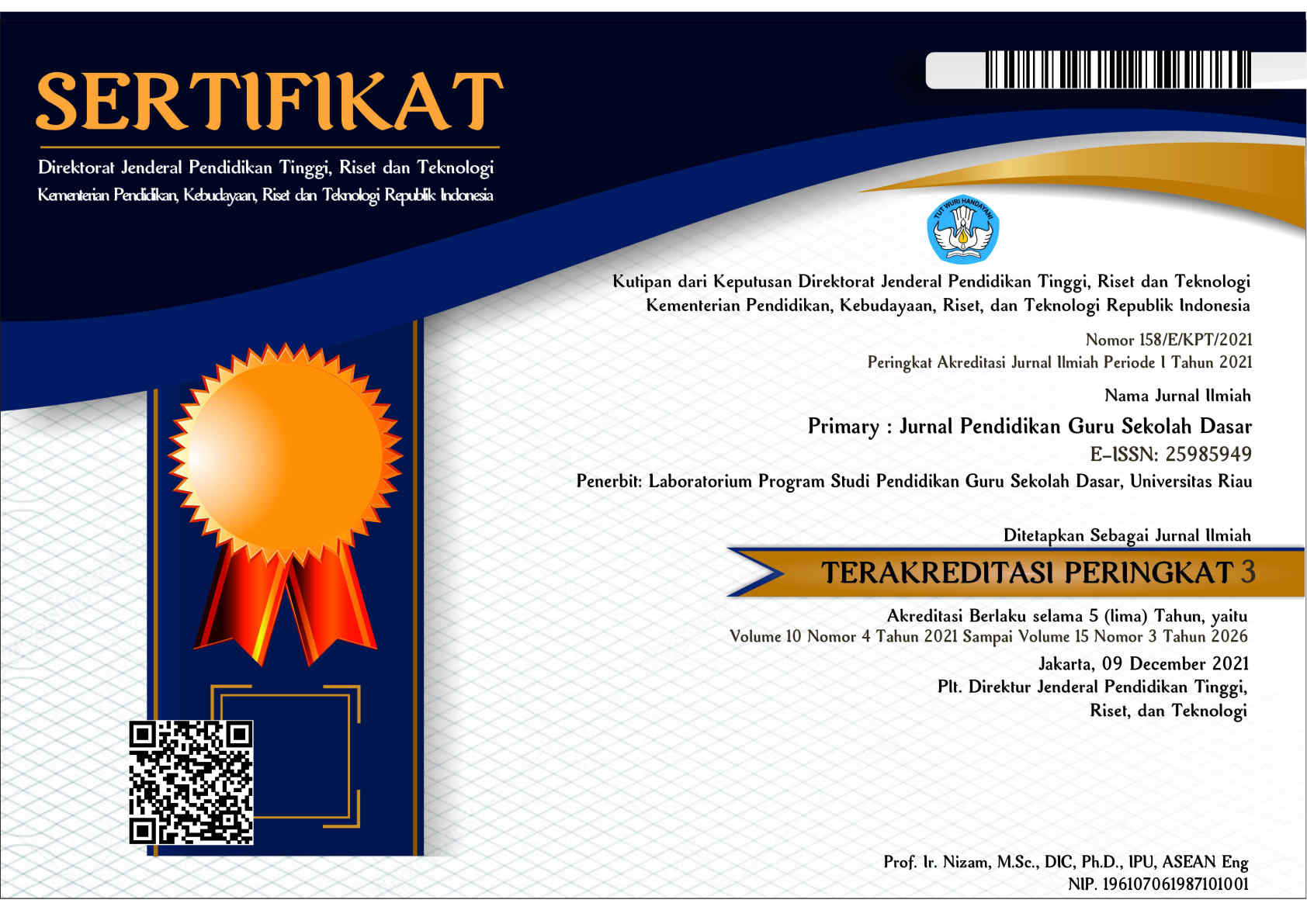PENERAPAN MODEL PEMBELAJARAN BERBASIS MASALAH (PBM) UNTUK MENINGKATKAN HASIL BELAJAR SISWA KELAS IV PADA TEMA 1 SDN 158 PEKANBARU
Abstract
The implementation of problem-based learning model it will endeavor that active students in the teaching and learning process, be active in thinking and can develop students' problem-solving skills so as to create active and independent learning so that student learning outcomes. To strengthen the scientific approach it is advisable to apply problem-based learning to encourage students to be creative and contextual both individually and in the group's purpose of this study was to improve the learning outcomes of class IV students in Theme I SDN 158 Pekanbaru by applying a problem-based learning model. This type of research is classroom action research, with a collaborative pattern, the purpose of this classroom action research is to improve student learning outcomes, and improve the quality of applied learning practices. The research subjects were grade IVA students at SDN 158 Pekanbaru, which numbered 31 people. Consisting of 13 women and 18 men. The instruments of data collection in this study were observation sheets of teacher and student activities, observation sheets of student attitudes and test of learning outcomes. Data analysis techniques in this study used descriptive quantitative data analysis techniques. The results of this study are the application of a problem-based learning model can improve student learning outcomes in sub-theme 2 and sub-theme 3, namely the baseline score (UH subteam 1), which averages 69.03 increases in the daily repeat cycle I (UH sub-theme 2) average 73.70 and the daily repetition of cycle II (UH subteam 3) increased again to 84.03. The activities of teachers and students at each meeting in the first cycle and second cycle experienced an increase, although sometimes there were ups and downs.
Keywords
Full Text:
PDF (Bahasa Indonesia)References
Arikunto. (2016). Penelitian Tindakan Kelas. Jakarta: PT Bumi Aksara.
Aqib, Z. (2016). Penelitian Tindakan Kelas untuk guru SD, SMP, SMA, SMK . Bandung: Yrama Widya.
Fauzia, H. (2018). Penerapan Model Pembelajaran Problem Based Learning Untuk Meningkatkan Hasil Belajar Matematika SD. Primary: Jurnal Pendidikan Guru Sekolah Dasar, 7 (1), 40-47.
Kurniaman, O., & Noviana, E. (2017). Penerapan Kurikulum 2013 dalam Meningkatkan Keterampilan, Sikap, dan Pengetahuan. Primary : Jurnal Pendidikan Guru Sekolah Dasar, 6 (2). 389- 396.
Larisa, E. (2017). An educational model for the convergence of formal and non-formal education. Open Praxis, 9 (4), 375–386.
Rahayu, A & Faisal, S. (2019). Developing Science Teaching Material to Increase Elementary Student’s Science Procesess Skill. Journal of Teaching and Learning in Elementary Education, 2 (1), 53-59.
Purwanto, N. (2012). Prinsip-prinsip dan Teknik Evaluasi pengajaran. Yogyakarta: Remaja Rosda Karya.
Sugiyono. (2016). Metode Penelitian Kuantitatif Kualitatif dan R & D. Alfabeta: Bandung.
Trianto. (2011). Mendesain Model Pembelajaran Inovatif Progresif. Jakarta: Kencana Prenada Media Group.
Rabiah. (2018). Upaya Meningkatkan Hasil Belajar Matematika Melalui Model Pembelajaran Berbasis Masalah Di Kelas V Sd Negeri 008 Banjar Nan Tigo Kecamatan Inuman. Jurnal PAJAR (Pendidikan Guru Sekolah Dasar), 1 (1), 53-59.
DOI: http://dx.doi.org/10.33578/jpfkip.v8i1.6654
Refbacks
- There are currently no refbacks.
Copyright (c) 2019 Maimanah Hasan, Neni Hermita

This work is licensed under a Creative Commons Attribution-NonCommercial-ShareAlike 4.0 International License.
____________________________________________________________
Primary: Jurnal Pendidikan Guru Sekolah Dasar
Secretariat
Program Studi Pendidikan Guru Sekolah Dasar
Gedung B1, FKIP Universitas Riau
Kampus Bina Widya Km. 12,5 Simpang Baru Panam
Pekanbaru Riau Indonesia 28293
e-mail : primary@ejournal.unri.ac.id



